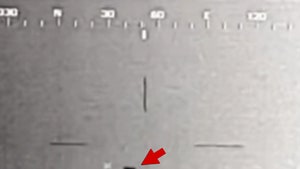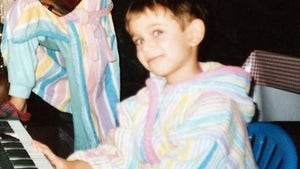Globe-winning Foreign Film, 'Paradise Now,' Controversial
NABLUS, West Bank -- The Palestinian film "Paradise Now," which explores the lives of a pair of suicide bombers and just won the Golden Globe for best foreign film, is getting mixed reviews in this tough West Bank city where it was filmed.
Although the film has never been screened in Nablus, many residents here have viewed several clips widely broadcast on satellite television, and some are not happy with what they have seen. Those giving the film thumbs down feel it portrays the bombers as less than heroic and godless.
"This movie doesn't help the Palestinian cause," said an armed Palestinian militant who would not give his name because he's on the run. "People who go to carry out bombings do not hesitate so much."
The film tells the story of two Nablus car mechanics who are sent to carry out a double suicide-bombing in Tel Aviv. They shave their beards to blend into Israeli crowds more easily, pray and prepare farewell videos.
The movie has generally been praised around the world and has been played in about 60 countries, according to director Hany Abu-Assad, an Arab born in Israel -- currently living in Holland -- who considers himself Palestinian.
Speaking during the glitzy Golden Globes ceremony Monday, Abu-Assad said he believed the film's success stemmed from the world's recognition that the Palestinians deserve "liberty and equality unconditionally."
The announcement at the ceremony that the award was going to Abu-Assad from Palestine ruffled some feathers in Israel and elsewhere since Palestinians do not yet have a state. Israeli Foreign Ministry spokesman Mark Regev said that it was incorrect to refer to a Palestine before a Palestinian state has been established. "There is a Palestinian Authority, but not a Palestinian state," Regev said.
It's official origin notwithstanding, Abu-Assad worked closely with both Israelis and Palestinians and filmed the movie on both sides of the divide.
Most of the movie was shot in Nablus, a militant stronghold and the home base of many of the suicide bombers sent to attack Israeli targets in recent years. The conflict served as a constant backdrop for the film, which showed houses demolished in Israeli army operations, the sound of airstrikes against Palestinian militants and large crowds waiting at army roadblocks.
The violence even interrupted the filming -- once when Israel carried out a missile strike at militants near the camera crew and once when militants briefly kidnapped a cameraman in an effort to stop the filming of a movie they believed would portray them in a negative light.
The filming was then moved to an Israeli Arab city to avoid further interruptions.
On Tuesday, a group of Palestinians at the Sport Shoes store in the center of the city argued over a breakfast of humus and falafel about whether or not the film should be shown in Nablus, where movie theaters were closed more than five years ago for providing frivolous entertainment in light of the bloody conflict.
"This movie wasn't interesting enough for us," said Ghassan Jbeileh, a shoe salesman. "We have enough problems with people who can't put food on the table."
A man with a pistol on his belt who would not give his name said the movie must be good for Israel or it would never have succeeded in Hollywood.
But Peter Samchan, a trader on the Palestinian stock exchange who saw clips of the film on the Al-Jazeera satellite station and read about it in the newspaper, said the Palestinians have to foster openness and should not have interrupted the filming or prejudged the movie.
"We need to let them do their work and then decide if it's good or not," he said. "How can we be called a democratic people if we don't let someone film a movie in Nablus."
Some hoped the film's international recognition would help relieve the Islamic hard-liners' influence on society and allow the screening of such a movie here.
"I have a dream that one day we will see it in a cinema in Nablus," said Muthana al-Qadi, who helped coordinate the filming here.
The film has met with mixed success in Israel, having been screened only a few times at a handful of cinemas. Some Israeli viewers said it helped them understand Palestinian suicide bombers, although not legitimize them.
As for how the Oscars organization is handling the question of the film's origins as that awards show approaches, it has designated it as "from Palestine," as well.
"We'll have to wait until the 31st to see if it gets nominated, said John Pavlik, spokesman for the Academy of Motion Picture Arts and Sciences. "There are other areas as well that are recognized for Foreign Language Awards purposes that are not countries -- Hong Kong, Taiwan, Puerto Rico. The (Academy's Foreign Language) committee wishes to be as inclusive as possible."
Amir Harel, the film's Israeli producer, said the mention of Palestine in the Globes ceremony did not bother him and he supported its presentation of a different, more human face for Palestinian suicide bombers.
"First and foremost the movie is a good work of art," Harel said. "But if the movie raises awareness or presents a different side of reality, this is an important thing."




